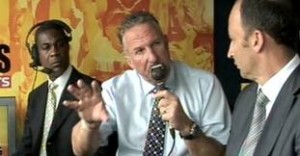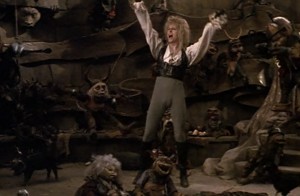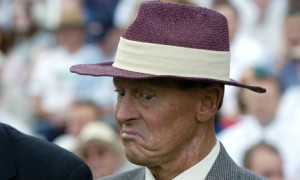
A gradual but inevitable descent into cricket-based loathing and bile.
The 51allout Bargain Basement Book Bonanza: It Sort Of Clicks by Peter Roebuck & Ian Botham
We at 51allout have received plenty of abuse over the years. Adam Dibble didn’t like it when we pointed out that Jos Buttler made a less than stellar start to his international career, Liam Plunkett didn’t like it when we accused him of looking like the Honey Monster (even though he very clearly does) and Steven Peter Devereux Smith blanked the hell out of us when we tried to get him to sign a ruddy great 51allout banner at Taunton. And in most cases, that lack of respect didn’t bother us. It comes with the job (or at least it would if this was actually a job and we got paid for it; we haven’t even had so much as a free six pack of Kingfisher for years now).
But one thing we can’t stand is when people accuse us of being anything less than committed to our ‘art’. While you’re out there having a life, meeting people and doing interesting things, the 51allout ensemble are slogging away behind the scenes writing articles, putting charts together or reading books from many years ago, for no apparent reason.
And so it came to pass that this writer spent several hours of his life reading a book published in 1986. And not just any book, but a bizarre collection of ramblings that goes from biography to autobiography, from hagiography to whatever the opposite of a hagiography is and back again. The book in question is ‘It Sort Of Clicks’ by Peter Roebuck and Ian Botham. The original intention was apparently to record conversations between the two, but that was replaced by a ‘he says she says’ format in which Roebuck pricks away at Botham’s bombastic nature before the latter talks about how right he is and how everyone else has completely missed the point. It’s probably fair to assume that the conversation idea failed because Botham wasn’t actually interested in any sort of back and forth, instead climbing straight onto his soapbox and letting fly.
Reading this book in 2014, it’s impossible to avoid using a large dollop of hindsight. We now know Botham as the absurd Sky commentator with the fifteen fielders at his disposal at any one time; back then he was apparently something of a major celebrity, on whose name alone newspapers could be sold. While this may be true, this book seems to catch him on the precipice, about to disappear completely up his own arse:
“I live my life in the public arena, more so even than the Prime Minister. In the summer of 1985 she went on holiday for a fortnight to Austria, and nothing was heard of her. My holidays are public property. They want to know what I’m up to every hour of every day, just in case.”
“I’ve been caught speeding a few times. It’s not a thing I do consciously. I don’t go up the motorway too fast in the hope of being caught: far from it. More often than not I’m caught when I’m going home. Once I was chased up the motorway for five miles; I was heading for my first Test match and was hardly aware of what I was doing. The policeman said it was the best chase he’d had in his life!”
“Some cricketers try to master a technique, so that every muscle in their body is absolutely under control. That isn’t my way. They are like classical pianists who spend every day practicing, whereas I’m like a jazz saxophonist who has a pretty good technique and wants to go into orbit…”
Roebuck’s bits are actually quite interesting, with him having a fairly grounded view of the world and being unafraid to sometimes criticise Botham. Although his opening chapter does contain the phrase
“Arriving exhausted in Cornwall, Ian apparently thumped a policeman. Let it pass.”
which is probably asking quite a lot from the reader, especially if you’ve ever punched a policeman and tried to pass it off as a joke.
The main problem with this book is that, while it covers a number of broad topics – playing against the West Indies, bowling, heavy bats, journalists and captaincy amongst them – it basically sets out to answer just one question – how and why is Botham so brilliant? – and yet rather fails to actually do so. Botham in particular is keen to emphasise that he basically just rolls up and has a bit of a dash. He’s not big on training, practicing, staying sober or any of the other fundamental principles of professionalism that we take for granted these days. In some ways, he doesn’t even seem to be that keen on cricket – it seems that he was some sort of sporting wunderkind who could have done anything.
Some other things that arise in the course of the book: Botham bloody loves Viv Richards and bloody hates Geoff Boycott, who he describes as having ‘sold his soul for his average’.
What really makes this book interesting is that shortly after it was written, Roebuck led what can be described as a ‘coup’ at Somerset, which saw Richards and Joel Garner both released, with Botham following shortly afterwards. Apparently the two authors never spoke again. And yet there’s nothing in the book to suggest that there was any kind of disagreement between them beforehand. Although there is a chapter on this topic (added after the original publication) it is noticeably lacking in Botham’s input, being written purely by Roebuck. As a result, the reader is left guessing at the real story behind the story. As with all the topics in this book, there are a lot of questions, most of which are simply smothered by Botham who, for all his talents, was a much, much better cricketer than writer. Or commentator, for that matter.




No Comments
Post a Comment